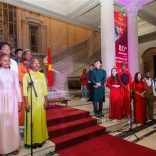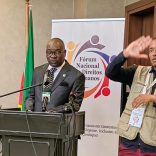Canadian High Commissioner bids farewell following meeting with President of Mozambique
Amnesty International calls for Mozambique to investigate alleged executions

Amnesty International has called on the Mozambican government to undertake “immediate, thorough and impartial investigation” of all allegations of extrajudicial killings in the country, fulfilling the commitments it made yesterday in the UN Human Rights Council in Geneva.
At the end of its Universal Periodic Review, a mechanism for evaluating the human rights situation in every UN member state, Mozambique accepted a recommendation to ensure that arbitrary detention, allegations of excessive use of force, extrajudicial executions, torture and other inappropriate treatment by agents of the state are subject to immediate, thorough and impartial investigation, the Amnesty International envoy to Geneva told Lusa.
Amnesty coordinator for Mozambique and Angola, Mariana Abreu, said that the human rights organisation welcomed the acceptance, but noted that Mozambique made the same commitment on the occasion of its last periodic review in 2011, without fulfilling its provision in the interim.
“There was a failure in implementation. There are several reports – actually the number of report has increased – of extrajudicial killings in the country” with those responsible remaining even unidentified.
In a statement before the UN Council for Human Rights, Abreu cited the case of a smallholder from the Mozambican province of Manica, Benedito Sabão, who on May 10 this year was arbitrarily arrested, ill-treated and shot, allegedly by secret services agents, for allegedly supporting the main opposition party, the Mozambique National Resistance (Renamo).
She also mentioned the death of Professor Gilles Cistac on March 2 2015, shot by a still-unidentified assailant in what appears to be an extrajudicial execution for advocating more autonomy for the provinces of Mozambique.
In both cases, according to Abreu, cited by Lusa, there was no formal or conclusive investigation.
“These two cases are emblematic because they show what is happening in the country: extrajudicial killings in which the perpetrators are not even identified, let alone subjected to justice,” she said.
Asked about the estimated number of extrajudicial executions, Abreu said she did not have numbers, only reports collected during Amnesty International’s most recent visit to the country in May.
“There are reports of people who allegedly support Renamo and are persecuted, but there are also reports that Renamo itself is killing Frelimo supporters,” she said.
She reminded reporters that more than 10,000 Mozambicans had fled to Malawi “because of these persecutions” and recalled the case of the alleged mass grave reported by farmers in the Gorongosa region in May, allegedly containing more than 100 bodies.
“No investigation was carried out. The area was cordoned off by the government and no one could see,” she said, reiterating Amnesty’s appeal: “What we ask for is impartial investigation.”












Leave a Reply
Be the First to Comment!
You must be logged in to post a comment.
You must be logged in to post a comment.